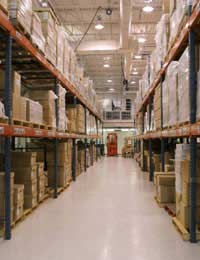Customs and Temporary Storage

When your export business handles goods that will move out of the European Union (EU) these are called none-Community goods. Often, your business will need to store these non-Community goods while their customs status is decided, or while the goods wait for re-export. In these cases your business must use what is called temporary storage at a designated temporary storage facility. It is important to ensure your business handles its storage of customs goods carefully as failure to do so can attract a penalty under the Customs (Contravention of a Relevant Rule) Regulation 2003.
Approved Premises
HM Revenue & Customs (HMRC) governs the use of premises for use as temporary storage. There are several types of storage facility that can be approved for your business to use as temporary storage. Approved premises can include:- Remote transit sheds
- Transit sheds
- Transit sheds within ICDs (Inland Clearance Depots)
- Enhanced Remote Transit Sheds (ERTS)
Note that your business can store any type of goods in a temporary storage facility, but your business will need to make special arrangements to store firearms and foodstuffs. The HMRC customs notice 199A has more details. Also, if your business is storing any animal products these cannot be stored until they have been checked by a representative of the Department for the Environment Food and Rural Affairs (Defra).
If your business wants to store any plant based goods, there is now a system in place that enables you to move your consignments to an ERTS where Defra and the Horticultural Marketing Inspectorate (HMI) can inspect them. More information about this service is available on the HMRC website.
Generally, temporary storage comes into play when goods are imported from a none EU Member State as duty is likely to be payable on these goods. As an exporter you should still be aware of the regulations regarding temporary storage as your business may need to re-export the goods you have bought into the UK. Using temporary storage offers your business a number of advantages including:
Better Cashflow
As the goods you have placed into temporary storage do not attract any duty, your business doesn’t have to pay that duty until the temporary storage time period has expired. Note that to be able to use temporary storage HMRC will need what is called a deed of undertaking. This is a financial guarantee that shows your business can pay the duty that may become due on the goods you are storing.
Reduced Costs
Each port within the UK has its own temporary storage facility, but a cost is associated with using these services. Often, businesses that use temporary storage as part of their usual export systems will have their own temporary storage facilities that are cheaper.
Business Planning
Using a temporary storage facility whether this is owned by the port authority or your business, you can plan your export systems to ensure you have adequate time organise the customs declarations you will need to produce. Holding goods in temporary storage gives your business a resource it can use to develop an efficient export process.
Time and Temporary Storage
The use of premises for temporary storage gives your business the opportunity to import none EU goods and store them free of duty before your business re-exports them. You should be aware of the time limits that temporary storage places on any stored consignments. There are two general time limits to be aware of:- If you import goods using rail, road or air you have 20 days of storage time
- If you import goods using sea transport you have 45 days of storage time
Goods Handling in Temporary Storage
Your business should be aware that goods that use temporary storage facilities cannot be changed or modified in any way. The goods in temporary storage facilities have been identified using the Tariff. As such your business is not able to modify or otherwise process the goods you are storing.You can change the packaging of certain goods to ensure they are preserved in their original state, but you can’t change what are called the ‘technical characteristics’ of the stored goods. This is because the customs duty has already been calculated via the customs declaration you have submitted. Any change to the goods would invalidate the declaration.
Business Energy With a Difference
If you are looking for business energy or need advanced solutions like remote energy monitoring, new supplies, downgrading or upgrading capacity, have a no obligation chat with Purely Energy.
To find our more get in touch here. or call 0161 521 3400.








